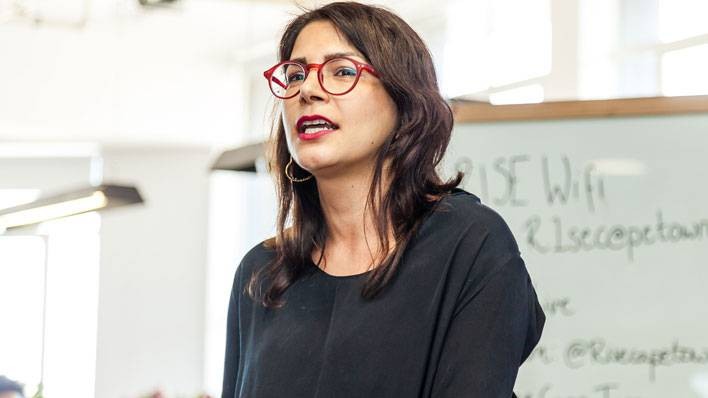
Rise: the view from Cape Town
In the first of a new series profiling Barclays Rise hubs around the world, we speak to Yasaman Hadjibashi, Group Chief Creation Officer for Barclays Africa Group, about how new banking technology is impacting the continent and what’s in prospect at Barclays’ Cape Town Accelerator.
This year’s Cape Town Barclays Accelerator for innovative fintech companies begins in May. What’s new this year?
The 2017 Accelerator is going to be a bit different. We’re targeting more mature start-ups: companies that are beyond the seed stage and have already tested products. This means we’ll be able to move a lot faster, and we can help companies scale and distribute rather than just build.
Have you noticed a trend in the specialisms of Cape Town fintechs?
It’s very diversified. There’s not one sector which is dominant. The typical themes that you see everywhere – from AI to blockchain to the Internet of Things – are the themes in Africa too, but I’d say that the top three are payments, digital inclusion and analytics.
Has there been an increase in interest in the 2017 Accelerator?
This year, we expected applications to go down, because we thought these more mature companies we’re targeting to be reluctant to give up equity to our partner Techstars, who work on an equity for advice model. But companies are so keen to scale out their existing products to the African market that applications have actually gone up: more than 500 companies from 56 countries. Over 50 per cent of applicants were from Africa, but outside of that our highest numbers of applications came from the US and the UK.

Yasaman Hadjibashi, Group Chief Creation Officer for Barclays Africa Group
What developments do you predict in fintech over the next two years?
One of the biggest gamechangers for our continent is going to be payments. The problem for us in Africa is that banking is expensive. It’s a paradox: you think that in a poor continent banking would be cheap, but actually it costs; transactions cost, using your ATM card costs, online banking costs. The biggest disruptors are going to be payment companies that can offer individual products, be they saving accounts or credit cards, at low or no cost. That will also help financial inclusion and open up banking services to a lot of consumers who can’t afford them right now.
The other big disruptor will be in data analytics and alternative lending. This is a very young continent, where over 50 per cent of the population is under 25, and they need to start getting banked. They need to build their credit background – even if credit is going to have a whole new definition in the next 10 to 20 years. That will allow consumers to access all sorts of new products or assets, and the reality is that the bigger institutions are still relying on traditional methods of assessing credit risk for new consumers. That closes the funnel to financial services for those with no credit.
A lot of people struggle accessing official documentation to prove their creditworthiness, so it’s about changing the way we collect and access data. Using social data and behavioural data will make a big difference to how banking can be more democratised in the continent, and I expect there to be big strides in that over the next 24 months.
Are there other ways you use the expertise you have in technology to make a big social impact across Africa?
We have cases of new, innovative customer propositions catering to certain target segments that can partner with us, as a big financial services provider, to gain wholly new contexts and markets. For example, Asoriba was part of our 2016 cohort, and they have created customer relationship management applications for church administration. This is a big deal in much of Africa, and it’s something that’s being done very manually, with great opportunities to digitise. They came up with an app specific to this niche segment, and we saw an opportunity to partner up with them, finding the users of this app and offering them banking opportunities and layering that on top. So our involvement with them generated high quality leads with high percentage conversion rates, as well as helping Asoriba’s customers. This might sound like sales, but it’s actually about using fintech to go into an underbanked community where we didn’t previously have any dialogue and creating a financial relationship with them.
It’s a success story where something very niche but very innovative can come into a banking environment and make a real difference.
What most excites you about what’s happening at Rise?
Being involved with creative problem-solving with new entrepreneurs, and not knowing exactly where it’s headed. When you can see the destination, there’s less room for changing the path. Exploring new products and services in a more experimental, open-ended way is actually very beautiful. Our knowledge of the benefits of how new technology can change business is continually developing, and that’s what excites me the most.